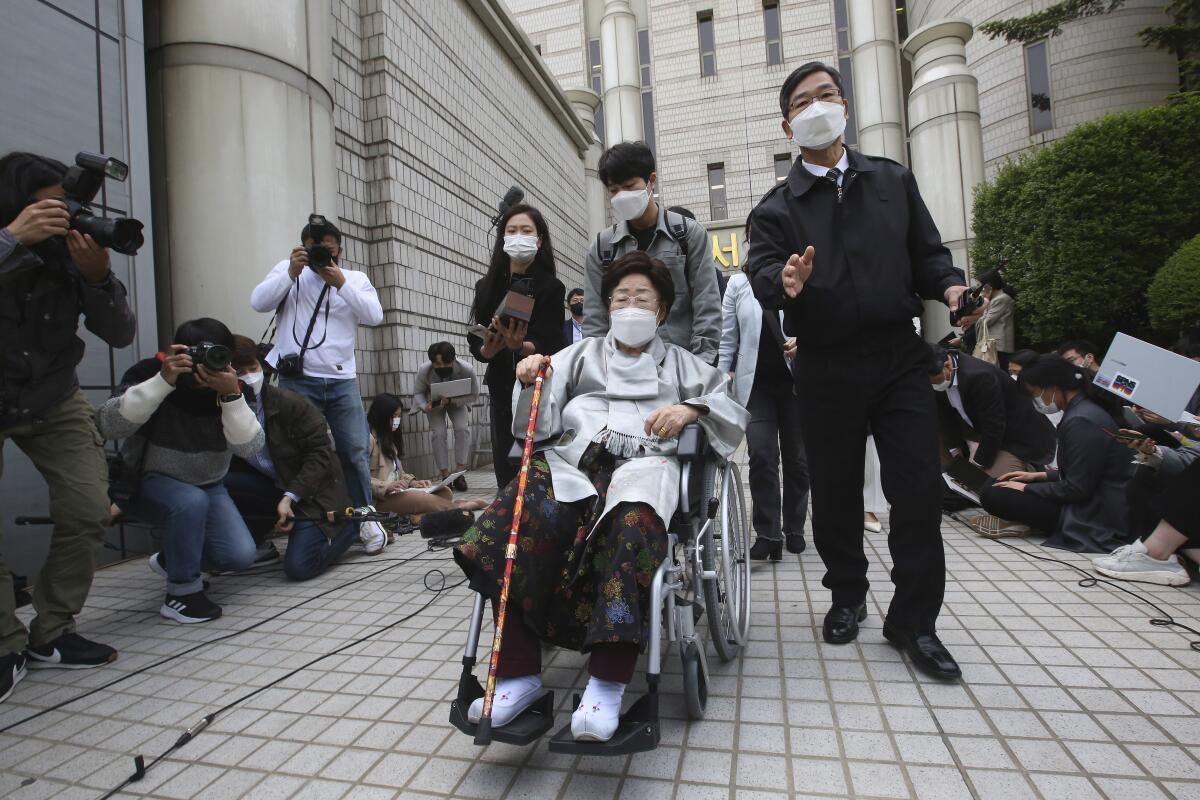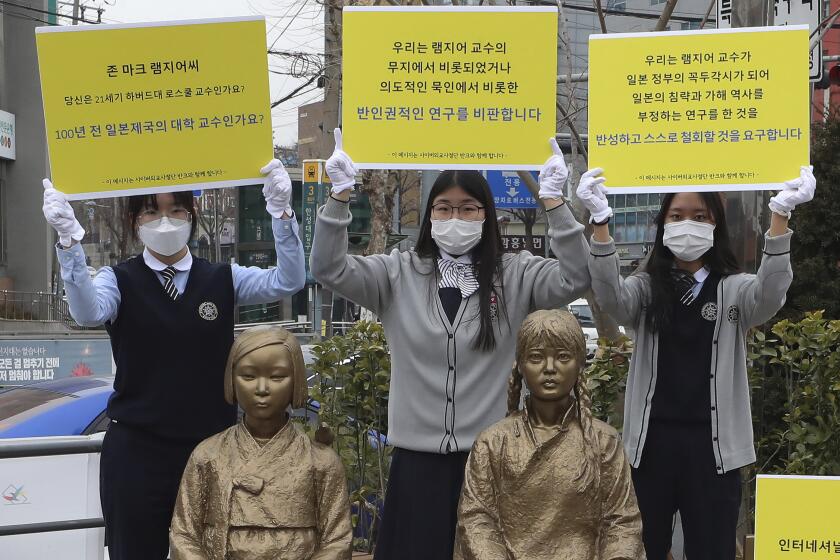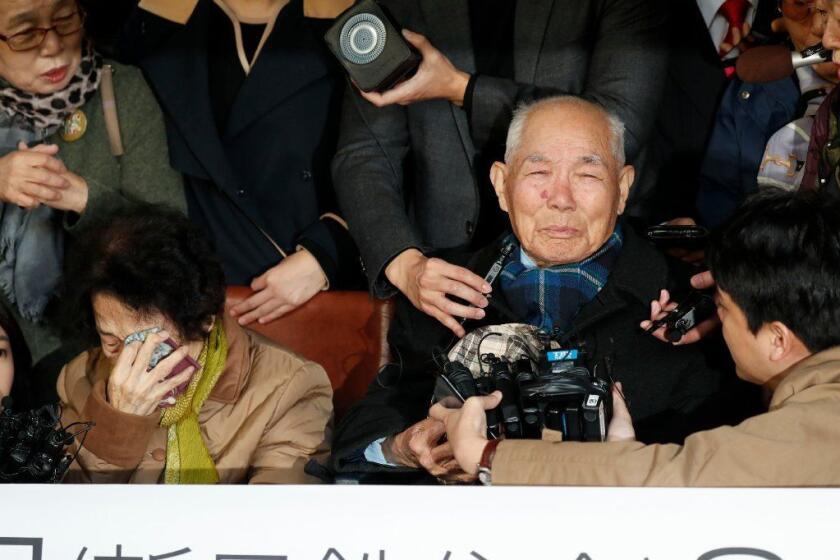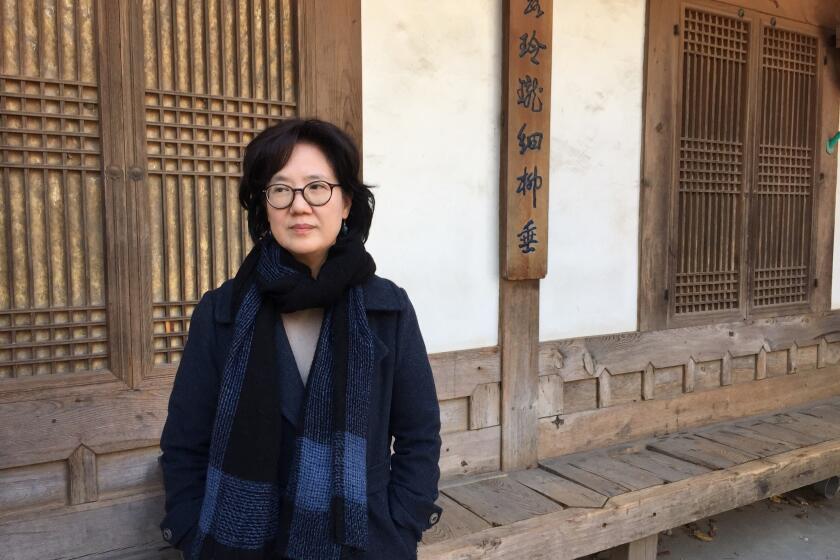Seoul court rejects wartime sexual slavery claim against Japan

- Share via
SEOUL — A South Korean court Wednesday rejected a claim by South Korean sexual slavery victims and their relatives who sought compensation from the Japanese government over their wartime sufferings.
The Seoul Central District Court based its decision on diplomatic considerations and principles of international law that grant states immunity from the jurisdiction of foreign courts. This appeared to align with the position maintained by Tokyo, which had boycotted the court proceedings and insists that all wartime compensation issues were settled under a 1965 treaty normalizing relations with Seoul.
Activists representing sexual slavery victims, known as “comfort women,” denounced the decision and said the court was ignoring their struggles to restore the women’s honor and dignity. They said the plaintiffs would appeal.
It wasn’t immediately clear how the ruling would affect relations between the estranged U.S. allies. They spent years escalating their feud in public over issues stemming from Japan’s brutal occupation of Korea before the Biden administration pressured them to mend ties and cooperate in the face of threats from China and North Korea.
Japanese Chief Cabinet Secretary Katunobu Kato noted that the decision conflicted with a previous ruling from the same court in January on a separate case that found the Japanese government responsible for compensating sexual slavery victims.
Kato said he wouldn’t comment on the new ruling before examining the details more closely, but he added that Tokyo’s stance on the sexual slavery issue remains unchanged. He said the previous ruling violated international law and was unacceptable.
J. Mark Ramseyer has ignited international uproar for a paper claiming that Koreans who were kept as sex slaves in wartime Japan, many of them teenagers, had willingly chosen to work as prostitutes.
“Japan continues to strongly ask South Korea to take appropriate steps in order to correct the state of international violation,” he said.
The 20 plaintiffs, who had sued Japanese government in 2016, included 11 women who were forced to work at Japanese military brothels during World War II and relatives of other women who have since died.
The court said international law and previous rulings from South Korea’s Supreme Court make it clear that foreign governments should be immune from civil damage suits out of respect for their sovereignty.
“If we go against the [principles] of current customary international law ... a diplomatic clash with [Japan] will become unavoidable following the verdict and the process to forcibly execute it,” the court said in a statement.
A downward spiral in relations between South Korea and Japan has spawned a trade war and ignited massive protests and boycotts in South Korea.
The court also noted that the two countries never officially withdrew from a 2015 agreement that attempted to settle their long impasse over the issue, and that some Korean victims accepted payments from a Japanese-funded foundation created by the deal. This showed that it was possible for the countries to settle their dispute diplomatically, the court said.
One of the plaintiffs, 92-year-old Lee Yong-soo, repeated her call for South Korea and Japan to settle their decades-long impasse over sexual slavery by seeking judgment from the United Nations’ International Court of Justice.
Tens of thousands of women across Japanese-occupied Asia and the Pacific were moved to front-line brothels used by the Japanese military. About 240 South Korean women registered with the government as victims of sexual slavery by the Japanese military; only 15 of them are still alive.
Japan insists that compensation issues were settled under its 1965 treaty with South Korea, in which Tokyo provided $500 million in economic assistance to Seoul.
Park Yu-ha says that when she began writing her alternate take on “comfort women” — the euphemistic term for Korean women enslaved in Japanese brothels during World War II — she was hoping to ease discord between her native South Korea and Japan, where she spent years as a graduate student.
Amnesty International called Wednesday’s ruling a “major disappointment that fails to deliver justice to the remaining survivors of this military slavery system and to those who suffered these atrocities before and during World War II but had already passed away, as well as their families.”
The Seoul Central District Court, in a conflicting and largely symbolic ruling in January, had called on the Japanese government to give 100 million won ($89,000) each to a separate group of 12 women who sued in 2013 over their suffering as sex slaves.
The 2015 deal was widely unpopular among South Koreans, who accused Tokyo of trying to silence the victims with money. After taking office in 2017, South Korean President Moon Jae-in said the deal negotiated by his conservative predecessor lacked legitimacy because officials failed to properly communicate with victims before reaching it, and took steps to dissolve the Japanese-funded foundation.
In a major shift in tone, Moon said in a news conference in January that he recognizes the 2015 deal as a valid agreement between governments. He also described that month’s ruling on the sexual slavery survivors as “honestly a complicating” development for Seoul’s efforts to improve bilateral relations.
Start your day right
Sign up for Essential California for the L.A. Times biggest news, features and recommendations in your inbox six days a week.
You may occasionally receive promotional content from the Los Angeles Times.
Some analysts say Moon may have felt that American pressure to reconcile with Japan was coming and wanted to appear as a reasonable ally by extending Tokyo an olive branch. In a speech last month, Moon said his government was eager to build “future-oriented” ties with Tokyo.
Besides the impasse over sexual slavery, South Korea and Japan have sparred over South Korean court rulings that called for Japanese companies to compensate Koreans who were forced to work in factories during the war.
More to Read
Sign up for Essential California
The most important California stories and recommendations in your inbox every morning.
You may occasionally receive promotional content from the Los Angeles Times.
















